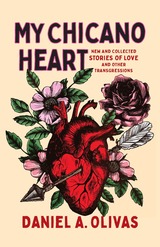39 start with D start with D
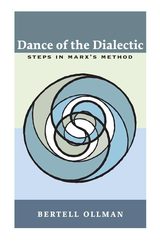
Marx made extremely creative use of dialectical method to analyze the origins, operation, and direction of capitalism. Unfortunately, his promised book on method was never written, so that readers wishing to understand and evaluate Marx's theories, or to revise or use them, have had to proceed without a clear grasp of the dialectic in which the theories are framed. The result has been more disagreement over "what Marx really meant" than over the writings of any other major thinker.
In putting Marx's philosophy of internal relations and his use of the process of abstraction--two little-studied aspects of dialectics--at the center of this account, Ollman provides a version of Marx's method that is at once systematic, scholarly, clear and eminently useful.
Ollman not only sheds important new light on what Marx really meant in his varied theoretical pronouncements, but in carefully laying out the steps in Marx's method makes it possible for a reader to put the dialectic to work in his or her own research. He also convincingly argues the case for why social scientists and humanists as well as philosophers should want to do so.
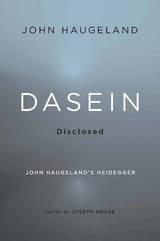
The author of discipline-defining studies of human cognition and artificial intelligence, John Haugeland was a charismatic, highly original voice in the contemporary forum of Anglo-American analytic philosophy. At his death in 2010, he left behind an unfinished manuscript, more than a decade in the making, intended as a summation of his life-long engagement with one of the twentieth century’s most influential philosophical tracts, Heidegger’s Being and Time (1927). Dasein Disclosed brings together in a single volume the writings of a man widely acknowledged as one of Heidegger’s preeminent and most provocative interpreters.
A labyrinth of notoriously difficult ideas and terminology, Being and Time has inspired copious commentary. Not content merely to explain, Haugeland aspired to a sweeping reevaluation of Heidegger’s magnum opus and its conception of human life as Dasein—a reevaluation focused on Heidegger’s effort to reawaken philosophically dormant questions of what it means “to be.” Interpreting Dasein unconventionally as “the living of a living way of life,” Haugeland put involvement in a shared world, rather than individual persons or their experience, at the heart of Heidegger’s phenomenology of understanding and truth. Individuality, Haugeland insists, emerges in the call to take responsibility for a collective way of being in the world. He traces this thought to Heidegger’s radical conclusion that one does not truly understand philosophical concepts unless that understanding changes how one lives.
As illuminating as it is iconoclastic, Dasein Disclosed is not just Haugeland’s Heidegger—it is a major contribution to philosophy in its own right.
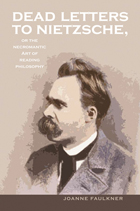
Dead Letters to Nietzsche examines how writing shapes subjectivity through the example of Nietzsche’s reception by his readers, including Stanley Rosen, David Farrell Krell, Georges Bataille, Laurence Lampert, Pierre Klossowski, and Sarah Kofman. More precisely, Joanne Faulkner finds that the personal identification that these readers form with Nietzsche’s texts is an enactment of the kind of identity-formation described in Lacanian and Kleinian psychoanalysis. This investment of their subjectivity guides their understanding of Nietzsche’s project, the revaluation of values.
Not only does this work make a provocative contribution to Nietzsche scholarship, but it also opens in an original way broader philosophical questions about how readers come to be invested in a philosophical project and how such investment alters their subjectivity.

A poetic meditation on the challenges and pleasures of contemporary speculative fiction
Winner of the Elizabeth Agree Prize in American Literary Studies
Dear Incomprehension: On American Speculative Fiction is a thought-provoking exploration of the fascinating field of contemporary speculative fiction, a genre that transcends boundaries and encompasses science fiction, fabulist tales, modern fairy tales, and experimental narratives that challenge the very essence of storytelling and reading.
Written as a philosophical essay that mirrors the unorthodox nature of the texts it analyzes, Dear Incomprehension examines American works that defy traditional narrative devices such as plot, character, logic, and even legibility. Drawing on a number of philosophical theories, among them object-oriented ontology and speculative realism, Vanderhaeghe argues that these unconventional works resist the standard tools of criticism, demanding instead a novel perspective and approach.
An in-depth resource for scholars and students of contemporary literature, philosophy, and digital literary studies, Dear Incomprehension offers a fresh framework for analyzing experimental fiction and alternative modes of meaning-making. It is a must-read for those seeking to grasp the complexities and nuances of American experimental and speculative fiction.
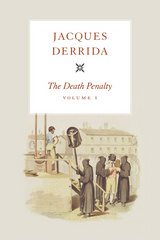
With his signature genius and patient yet dazzling readings of an impressive breadth of texts, Derrida examines everything from the Bible to Plato to Camus to Jean Genet, with special attention to Kant and post–World War II juridical texts, to draw the landscape of death penalty discourses. Keeping clearly in view the death rows and execution chambers of the United States, he shows how arguments surrounding cruel and unusual punishment depend on what he calls an “anesthesial logic,” which has also driven the development of death penalty technology from the French guillotine to lethal injection. Confronting a demand for philosophical rigor, he pursues provocative analyses of the shortcomings of abolitionist discourse. Above all, he argues that the death penalty and its attendant technologies are products of a desire to put an end to one of the most fundamental qualities of our finite existence: the radical uncertainty of when we will die.
Arriving at a critical juncture in history—especially in the United States, one of the last Christian-inspired democracies to resist abolition—The Death Penalty is both a timely response to an important ethical debate and a timeless addition to Derrida’s esteemed body of work.
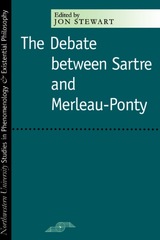
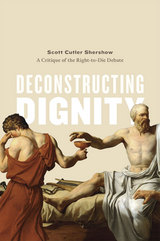
Shershow examines texts from Cicero’s De Officiis to Kant’s Groundwork of the Metaphysics of Morals to court decisions and religious declarations. Through them he reveals how arguments both supporting and denying the right to die undermine their own unconditional concepts of human dignity and the sanctity of life with a hidden conditional logic, one often tied to practical economic concerns and the scarcity or unequal distribution of medical resources. He goes on to examine the exceptional case of self-sacrifice, closing with a vision of a society—one whose conditions we are far from meeting—in which the debate can finally be resolved. A sophisticated analysis of a heated topic, Deconstructing Dignity is also a masterful example of deconstructionist methods at work.
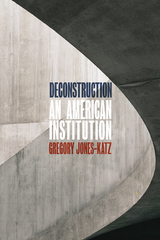
Deconstruction begins well before Jacques Derrida’s initial American presentation of his deconstructive work in a famed lecture at Johns Hopkins University in 1966 and continues through several decades of theoretic growth and tumult. While much of the subsequent story remains focused, inevitably, on Yale University and the personalities and curriculum that came to be lumped under the “Yale school” umbrella, Deconstruction makes clear how crucial feminism, queer theory, and gender studies also were to the lifeblood of this mode of thought. Ultimately, Jones-Katz shows that deconstruction in the United States—so often caricatured as a French infection—was truly an American phenomenon, rooted in our preexisting political and intellectual tensions, that eventually came to influence unexpected corners of scholarship, politics, and culture.
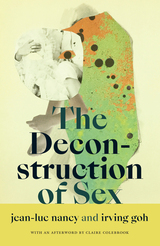

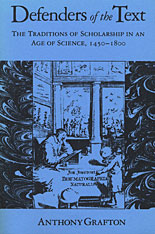
Anthony Grafton is erudite and elegant in the style of the best historical writers who make the past come alive for the reader. In a full-scale presentation of the world of scholarship, from the Renaissance to the modern period, Grafton sets before us in three-dimensional detail such seminal figures as Poliziano, Scaliger, Kepler, and Wolf. He calls attention to continuities, moments of crisis, and changes in direction.
The central issue in Defenders of the Text is the relation between humanism and science from the mid-fifteenth century to the beginning of the modern period. Treatments of Renaissance humanism in English have emphasized the humanists’ commitment to rhetoric, ethics, and politics and have accused the humanists of concentrating on literary matters in preference to investigating the real world via new developments in science, philosophy, and other technical disciplines. This revisionist book demonstrates that humanism was neither a simple nor an impractical enterprise, but worked hand-in-hand with science in developing modern learning.
Grafton makes clear that humanism remained an integral and vital part of European culture until the eighteenth century, maintaining a technical component of its own—classical philology—which developed in as rich, varied, and unexpected a way as any other field of European thought. Attention to the text led the humanists to develop a whole range of cools and methods that lent power to science and learning for centuries to come. Grafton shows the continued capacity of classical texts to provoke innovative work in both philology and philosophy, and traces a number of close and important connections between humanism and natural science. His book will be important to intellectual historians, students of the classics and the classical tradition, and historians of early modern science.

The pitfalls of cultural memory and forgetting, understood through the genealogy of the phenomenon called déjà vu
Referring to a past that never was, déjà vu shares a structure not only with fiction, but also with the ever more sophisticated effects of media technology. Tracing the term from the end of the nineteenth century, when it was first popularized in the pages of the Revue philosophique, Peter Krapp examines the genealogy and history of the singular and unrepeatable experience of déjà vu. This provocative book offers a refreshing counterpoint to the clichéd celebrations of cultural memory and forces us do a double take on the sanctimonious warnings against forgetting so common in our time.
Disturbances of cultural memory—screen memories, false recognitions, premonitions—disrupt the comfort zone of memorial culture: strictly speaking, déjà vu is neither a failure of memory nor a form of forgetting. Krapp’s analysis of such disturbances in literature, art, and mass media introduces, historicizes, and theorizes what it means to speak of an economy of attention or distraction. Reaching from the early psychoanalytic texts of Sigmund Freud to the plays of Heiner Müller, this exploration of the effects of déjà vu pivots around the work of Walter Benjamin and includes readings of kitsch and aura in Andy Warhol’s work, of cinematic violence and certain exaggerated claims about shooting and cutting, of the memorial character of architecture, and of the high expectations raised by the Internet.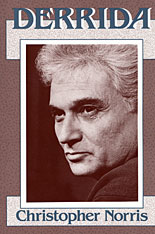
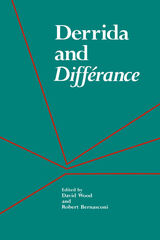
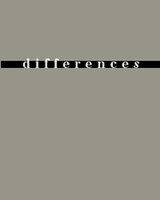
In bringing together major feminist critics whose work has been touched by the writings of Derrida, this issue both pays tribute to and reflects upon Derrida’s ideas. Among the essayists included, Jane Gallop considers Derrida’s writings on Levinas; Judith Butler reads Derrida’s final interview in Le Monde in 2004; Elizabeth Grosz signals Derrida as a rare philosopher for whom sexual difference was crucial; Gayatri Chakravorty Spivak explores the figure of the mother’s child in Derrida, focusing on the critique of reproductive heteronormativity and the question of agency in feminism; and Joan Wallach Scott argues for the importance of critique in the academy. The issue also includes an edited transcription of a vibrant discussion between feminist theorists and Derrida called “Women in the Beehive: A Seminar with Jacques Derrida,” which took place at Brown University’s Pembroke Center for Teaching and Research on Women in 1984.
Contributors. Fran Bartkowski, Anne-Emmanuelle Berger, Susan Bernstein, Judith Butler, Pheng Cheah, Drucilla Cornell, Jane Gallop, Elizabeth Grosz, Peggy Kamuf, Christie McDonald, Joan Wallach Scott, Gayatri Chakravorty Spivak
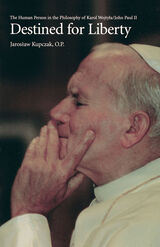

Presenting a new interpretation of humanist historiography, Donald J. Wilcox traces the development of the art of historical writing among Florentine humanists in the fifteenth century. He focuses on the three chancellor historians of that century who wrote histories of Florence—Leonardo Bruni, Poggio Bracciolini, and Bartolommeo della Scala—and proposes that these men, especially Bruni, had a new concept of historical reality and introduced a new style of writing to history. But, he declares, their great contributions to the development of historiography have not been recognized because scholars have adhered to their own historical ideals in judging the humanists rather than assessing them in the context of their own century.
Mr. Wilcox introduces his study with a brief description of the historians and historical writing in Renaissance Florence. He then outlines the development of the scholarly treatment of humanist historiography and establishes the need for a more balanced interpretation. He suggests that both Hans Baron’s conception of civic humanism and Paul Oscar Kristeller’s emphasis on the rhetorical character of humanism were important developments in the general intellectual history of the Renaissance and, more specifically, that they provided a new perspective on the entire question of humanist historiography.
The heart of the book is a close textual analysis of the works of each of the three historians. The author approaches their texts in terms of their own concerns and questions, examining three basic elements of their art. The first is the nature of the reality the historian is recounting. Mr. Wilcox asks, “What interests the writer? What is the substance of his narrative?… What does he choose from his sources…and what does he ignore? What does he interpolate into the account by drawing on his own understanding of the nature of history?” The second is the various attitudes—moral judgments, historical conceptions, analytical views—with which the historian approaches his narrative. And the third is the aspect of humanist historiography to which previous scholars have paid the least attention: the historian’s narrative technique. Mr. Wilcox identifies the difficulties involved in expressing historical ideas in narrative form and describes the means the historians developed for overcoming those difficulties. He emphasizes the positive value of rhetoric in their works and points out that they “sought by eloquence to teach men virtue.”
He devotes three chapters to Bruni, whom he considers the most original and important of the three historians. The next two chapters deal with Poggio, and the last with Scala. Throughout the book Mr. Wilcox exposes the internal connections among the three histories, thus illustrating the basic coherence of the humanist historical art.
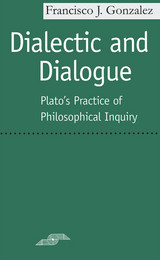
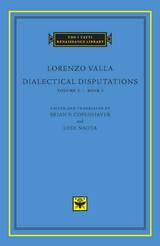
Lorenzo Valla (1407–1457) ranks among the greatest scholars and thinkers of the Renaissance. He secured lasting fame for his brilliant critical skills, most famously in his exposure of the “Donation of Constantine,” the forged document upon which the papacy based claims to political power. Lesser known in the English-speaking world is Valla’s work in the philosophy of language—the basis of his reputation as the greatest philosopher of the humanist movement.
Dialectical Disputations, translated here for the first time into any modern language, is his principal contribution to the philosophy of language and logic. With this savage attack on the scholastic tradition of Aristotelian logic, Valla aimed to supersede it with a new logic based on the actual historical usage of classical Latin and on a commonsense approach to semantics and argument. Valla provides a logic that could be used by lawyers, preachers, statesmen, and others who needed to succeed in public debate—one that was stylistically correct and rhetorically elegant, and thus could dispense with the technical language of the scholastics, a “tribe of Peripatetics, perverters of natural meanings.” Valla’s reformed dialectic became a milestone in the development of humanist logic and contains startling anticipations of modern theories of semantics and language.
Volume 1 contains Book I, in which Valla refutes Aristotle’s logical works on the categories, transcendentals, and predicables, with excursions into natural and moral philosophy and theology.
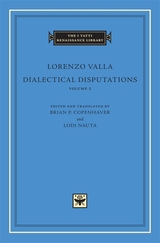
Lorenzo Valla (1407–1457) ranks among the greatest scholars and thinkers of the Renaissance. He secured lasting fame for his brilliant critical skills, most famously in his exposure of the “Donation of Constantine,” the forged document upon which the papacy based claims to political power. Lesser known in the English-speaking world is Valla’s work in the philosophy of language—the basis of his reputation as the greatest philosopher of the humanist movement.
Dialectical Disputations, translated here for the first time into any modern language, is his principal contribution to the philosophy of language and logic. With this savage attack on the scholastic tradition of Aristotelian logic, Valla aimed to supersede it with a new logic based on the actual historical usage of classical Latin and on a commonsense approach to semantics and argument. Valla provides a logic that could be used by lawyers, preachers, statesmen, and others who needed to succeed in public debate—one that was stylistically correct and rhetorically elegant, and thus could dispense with the technical language of the scholastics, a “tribe of Peripatetics, perverters of natural meanings.” Valla’s reformed dialectic became a milestone in the development of humanist logic and contains startling anticipations of modern theories of semantics and language.
Volume 2 contains Books II–III, in which Valla refutes Aristotle’s logical works on propositions, topics, and the syllogistic.
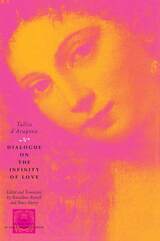
Sexually liberated and financially independent, Tullia d'Aragona dared to argue that the only moral form of love between woman and man is one that recognizes both the sensual and the spiritual needs of humankind. Declaring sexual drives to be fundamentally irrepressible and blameless, she challenged the Platonic and religious orthodoxy of her time, which condemned all forms of sensual experience, denied the rationality of women, and relegated femininity to the realm of physicality and sin. Human beings, she argued, consist of body and soul, sense and intellect, and honorable love must be based on this real nature.
By exposing the intrinsic misogyny of prevailing theories of love, Aragona vindicates all women, proposing a morality of love that restores them to intellectual and sexual parity with men. Through Aragona's sharp reasoning, her sense of irony and humor, and her renowned linguistic skill, a rare picture unfolds of an intelligent and thoughtful woman fighting sixteenth-century stereotypes of women and sexuality.
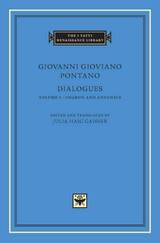
Giovanni Pontano (1426–1503), whose academic name was Gioviano, was the most important Latin poet of the fifteenth century as well as a leading statesman who served as prime minister to the Aragonese kings of Naples. His Dialogues are our best source for the humanist academy of Naples which Pontano led for several decades. They provide a vivid picture of literary life in the capital of the Aragonese seaborne empire, based in southern Italy and the Western Mediterranean. This first volume contains the two earliest of Pontano’s five dialogues. Charon, set in the underworld of classical mythology, illustrates humanist attitudes to a wide range of topics, satirizing the follies and superstitions of humanity. Antonius, a Menippean satire named for the founder of the Neapolitan Academy, Antonio Beccadelli, is set in the Portico Antoniano in downtown Naples, where the academicians commemorate and emulate their recently-deceased leader, conversing on favorite topics and stopping from time to time to interrogate passersby.
This volume contains a freshly-edited Latin text of these dialogues and the first translation of them into English.

Giovanni Gioviano Pontano (1429–1503) served five kings of Naples as a courtier, official, and diplomat, and earned even greater fame as a scholar, prose author, and poet. His Dialogues reflect his diverse interests in religion, philosophy, and literature, as well as in everyday life in fifteenth-century Naples. They are especially important for their vivid picture of the contemporary gatherings of Pontano and his friends in the humanist academy over which he presided from around 1471 until shortly before his death.
Volume 2 includes the Actius, named for one of its principal speakers, the great Neo-Latin poet Jacopo Sannazaro, and contains a perceptive treatment of poetic rhythm, the first full treatment of the Latin hexameter in the history of philology. The dialogue continues with a discussion of style and method in history writing, a landmark in the history of historiography. This is a new critical edition of the Actius and the first translation of this dialogue into English.

Giovanni Gioviano Pontano (1429–1503) served five kings of Naples as a courtier, official, and diplomat, and earned even greater fame as a scholar, prose author, and poet. His Dialogues reflect his diverse interests in religion, philosophy, and literature, as well as in everyday life in fifteenth-century Naples. They are especially important for their vivid picture of the contemporary gatherings of Pontano and his friends in the humanist academy over which he presided from around 1471 until shortly before his death.
This volume completes the I Tatti edition of Pontano’s five surviving dialogues and features both Aegidius and Asinus. The conversation in Aegidius, named for the Augustinian theologian Giles of Viterbo, ranges over various topics, including creation, dreams, free will, the immortality of the soul, the relation between heaven and earth, language, astrology, and mysticism. The Asinus is less a dialogue than a fantastical autobiographical comedy in which Pontano himself is represented as having gone mad and fallen in love with an ass. This is the first translation of these dialogues into English.
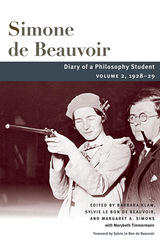
Presented for the first time in translation, this fully annotated first volume of the Diary includes essays from Barbara Klaw and Margaret A. Simons that address its philosophical, historical, and literary significance. It remains an invaluable resource for tracing the development of Beauvoir’s independent thinking and her influence on philosophy, feminism, and the world.
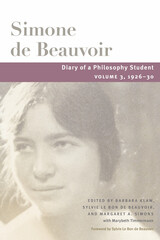
In addition, the editors include a wealth of important supplementary material. Barbara Klaw provides a detailed consideration of the Diary’s role in the development of Beauvoir’s writing style by exploring her use of metanarrative and other literary techniques, part of a process of literary creation that saw Beauvoir use the notebooks to cultivate her talent. Margaret A. Simons’s essay places the assault by Sartre within an appraisal of Beauvoir’s complicated legacy for #MeToo while suggesting readers engage with the diary through the lens of trauma.
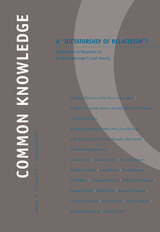
One essay relates the arguments of Ratzinger to those of two other German scholars—the conservative political theorist Ernst Wolfgang Böckenförde and the liberal philosopher and sociologist Jürgen Habermas—since all three men assume that social order depends on the existence of doctrinal authority (divine or otherwise). The contributors here argue for an intellectual and social life free of the desire for an “infantilizing” authority. One proposes that the Christian god is a relativist who prefers limitation and ambiguity; another, initially in agreement with Ratzinger about the danger relativism poses to faith and morals, then argues that this danger is what makes relativism valuable. The issue closes with the first English translation of an extract from a book on Catholic-Jewish relations by Cardinal Carlo Maria Martini, one of the Catholic Church’s most progressive figures.
Contributors. David Bloor, Daniel Boyarin, Mary Baine Campbell, Lorraine Daston, Arnold I. Davidson, John Forrester, Kenneth J. Gergen, Simon Goldhill, Jeffrey F. Hamburger, Julia Kristeva, Carlo Maria Cardinal Martini, Christopher Norris, Joseph Cardinal Ratzinger, Richard Shusterman, Barbara Herrnstein Smith, Jeffrey Stout, Gianni Vattimo

An innovative collection of comedic stories by the original “Renaissance man.”
Leon Battista Alberti (1404–1472) was among the most famous figures of the Italian Renaissance. His extraordinary range of abilities as a writer, architect, art theorist, and scientist made him the original model for the many-sided “Renaissance man.”
A collection of stories meant to be read while dining and drinking, the Dinner Pieces, or Intercenales, are one of Alberti’s most innovative and experimental works, mixing literary genres and styles of prose composition adapted from both Greek and Latin models. They cover a wide range of topics, from moral philosophy, politics, and religion to the arts, money-making, love and friendship, and the study of the humanities. The Dinner Pieces offer satiric commentary on the cultural illusions and moral myths of Alberti’s day. They cut through the absurdity of human existence with the blade of wit and laughter and constitute an important monument in the history of comic writing.
This English translation by David Marsh is based on the authoritative Latin text of Roberto Cardini, accompanied by ample notes.

An innovative collection of comedic stories by the original “Renaissance man.”
Leon Battista Alberti (1404–1472) was among the most famous figures of the Italian Renaissance. His extraordinary range of abilities as a writer, architect, art theorist, and scientist made him the original model for the many-sided “Renaissance man.”
A collection of stories meant to be read while dining and drinking, the Dinner Pieces, or Intercenales, are one of Alberti’s most innovative and experimental works, mixing literary genres and styles of prose composition adapted from both Greek and Latin models. They cover a wide range of topics, from moral philosophy, politics, and religion to the arts, money-making, love and friendship, and the study of the humanities. The Dinner Pieces offer satiric commentary on the cultural illusions and moral myths of Alberti’s day. They cut through the absurdity of human existence with the blade of wit and laughter and constitute an important monument in the history of comic writing.
This English translation by David Marsh is based on the authoritative Latin text of Roberto Cardini, accompanied by ample notes.
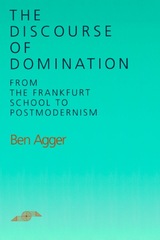
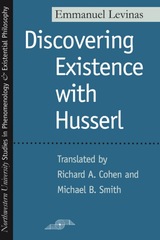
In collecting almost all of Levinas's articles on Husserlian phenomenology, this volume gathers together a wealth of thoughtful exposition and interpretation by one of the most important European philosophers of the twentieth century. Levinas's thought is relevant to a broad variety of disciplines and concerns. This volume serves as a reliable introduction for the beginning student, as well as satisfying the expert's more demanding and critical desire for insight into the complexities of Levinas's thought.
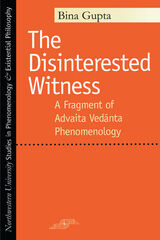
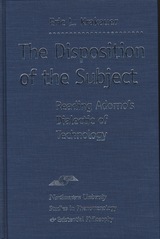
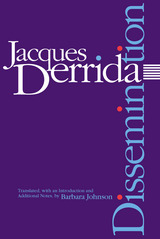
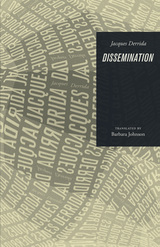
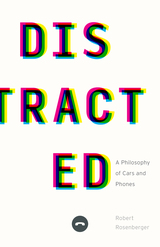
Applying insights from philosophy and cognitive science to address the urgent issue of smartphone-induced distracted driving
Although the dangers of texting while driving are widely known, many people resist the idea that phone usage will impair their driving. And connectivity features in new cars have only made using technology behind the wheel more tempting. What will it take to change people’s minds and behavior? Robert Rosenberger contends that a better understanding of why this combination of technologies is so dangerous could effectively adjust both habits and laws.
Rosenberger brings together ideas from philosophy and cognitive science to leverage a postphenomenological perspective that reveals how our smartphones make us such bad drivers. Reviewing decades of empirical studies in cognitive science, he shows that we have developed habits of perception regarding our compulsive technology use—habits that may wrest our attention away from the road.
Distracted develops innovative concepts for understanding technology-related habits and the ways that our relationships to our devices influence how we perceive the world. In turn, these ideas can help drivers be more cognizant of the effect that smartphone usage has on their perceptions, better inform efforts to enact stricter regulations, and help us all to be more reflective about the technologies that shape our lives.
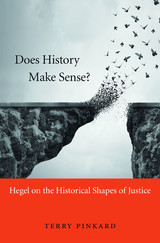
Hegel’s philosophy of history—which most critics view as a theory of inevitable progress toward modern European civilization—is widely regarded as a failure today. In Does History Make Sense? Terry Pinkard argues that Hegel’s understanding of historical progress is not the kind of teleological or progressivist account that its detractors claim, but is based on a subtle understanding of human subjectivity.
Pinkard shows that for Hegel a break occurred between modernity and all that came before, when human beings found a new way to make sense of themselves as rational, self-aware creatures. In Hegel’s view of history, different types of sense-making become viable as social conditions change and new forms of subjectivity emerge. At the core of these changes are evolving conceptions of justice—of who has authority to rule over others. In modern Europe, Hegel believes, an unprecedented understanding of justice as freedom arose, based on the notion that every man should rule himself. Freedom is a more robust form of justice than previous conceptions, so progress has indeed been made. But justice, like health, requires constant effort to sustain and cannot ever be fully achieved.
For Hegel, philosophy and history are inseparable. Pinkard’s spirited defense of the Hegelian view of history will play a central role in contemporary reevaluations of the philosopher’s work.
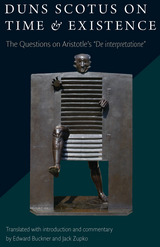
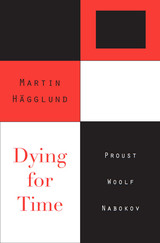
Marcel Proust, Virginia Woolf, and Vladimir Nabokov transformed the art of the novel in order to convey the experience of time. Nevertheless, their works have been read as expressions of a desire to transcend time—whether through an epiphany of memory, an immanent moment of being, or a transcendent afterlife. Martin Hägglund takes on these themes but gives them another reading entirely. The fear of time and death does not stem from a desire to transcend time, he argues. On the contrary, it is generated by the investment in temporal life. From this vantage point, Hägglund offers in-depth analyses of Proust’s Recherche, Woolf’s Mrs. Dalloway, and Nabokov’s Ada.
Through his readings of literary works, Hägglund also sheds new light on topics of broad concern in the humanities, including time consciousness and memory, trauma and survival, the technology of writing and the aesthetic power of art. Finally, he develops an original theory of the relation between time and desire through an engagement with Freud and Lacan, addressing mourning and melancholia, pleasure and pain, attachment and loss. Dying for Time opens a new way of reading the dramas of desire as they are staged in both philosophy and literature.
READERS
Browse our collection.
PUBLISHERS
See BiblioVault's publisher services.
STUDENT SERVICES
Files for college accessibility offices.
UChicago Accessibility Resources
home | accessibility | search | about | contact us
BiblioVault ® 2001 - 2024
The University of Chicago Press



